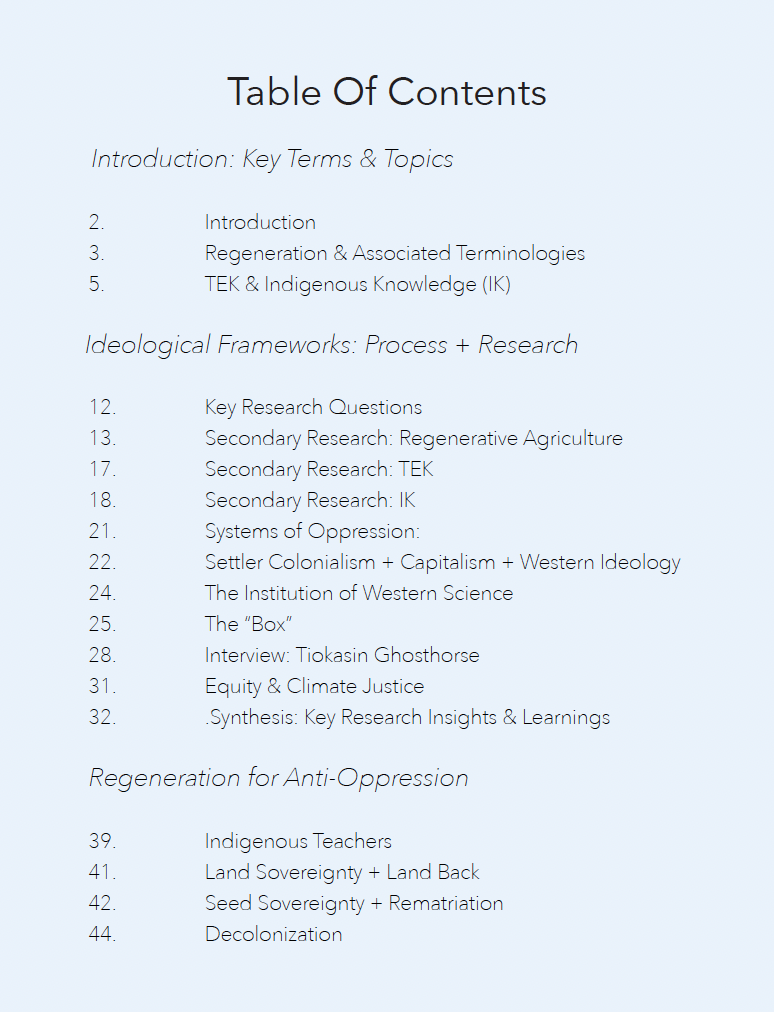2021 Thesis Research
Regenerative Agriculture, TEK, & Systems of Oppression
Deep research, interviews, & synthesis comprising a 63 pg. final compendium. See sample pages & citations below.
Guiding Research Questions
Why aren’t proponents of regenerative agriculture listening to the original people of this land when trying to heal it - where is the disconnect?
What is the purpose of regeneration - to heal the land or to perpetuate exploitation for financial gains?
What can we learn from the knowledge + wisdom of different indigenous peoples & how can we learn in a respectful/uplifting way?
How can we challenge neoclassical economic & settler colonialist structures within the framework of regeneration?
Summary/ Synthesis:
The root cause of climate change lies in the exploitation of nature and of human beings by human beings, for the creation of individual, privatized wealth & power. Exploitation is an ideological core of colonialism, & by extension capitalism, that has fueled the development of vast inequity & patterns of overconsumption globally. Human health is indivisible from environmental health, & the climate crisis is indivisible from the crisis of socio-economic inequity. Thus, effective climate restoration and regeneration solutions should focus on creating equity as partial functions of restoration systems, in lieu of the fact that environmental restoration is indivisible from the concept of human equity. Creating equity can, in some cases, inherently challenge capitalist systems & perceptions of ownership.
Regeneration falls in line with many proposed climate solutions by western capitalists, which are framed as “economic opportunities” within the very economic structures that result in climate change in the first place. Without expanding economic standards of value to include equity & to challenge systems of oppression, regeneration is used for the purpose of personal profit & continual ownership of land by capitalist colonial settlers, perpetuating the ideology of land as commodity, & maintaining systemic structural inequity. When Western Colonial ideologies shape the purpose & function of land regeneration, regenerative agriculture can be used as a tool to perpetuate settler colonialism, social inequality, and exploitation of workers.
Many Indigenous peoples/nations practiced & still practice forms what we call ‘regeneration’ for time immemorial with the land as IK & TEK. Indigenous people have consistently acted as frontline activists against the climate crisis with little recognition or opportunity for leadership in western circles & are responsible for many modern innovations in agricultural practice. This is beginning to change, but has also led to an exploitative search for indigenous knowledge as a result of misguided efforts on the part of settlers to address the climate crisis & to further occupy indigenous ancestral lands. There is a general disconnect between the original people of the land & publicized/visual representation of the regeneration movement, which is mainly embodied by white western scientists & land managers. This disconnect is the result of fundamental ideological differences regarding the purpose of regeneration between colonial settlers & different indigenous peoples & nations, & because of systems that oppress indigenous peoples, where the colonial settler has regeneration as a tool to continue settler colonialism within a capitalist system, out of necessity to address climate crisis & land degradation, & in an inability to challenge given power structures that may benefit them.
Many Indigenous leaders emphasize the value of reciprocity & systems thinking in human relationships with nature, and view humanity as equal to all life, toppling perceived human hierarchy over other beings & establishing humans as indivisible from the environment. The state of health of the natural environment is directly interchangeable with our own health. Centering regeneration on equity & respect for fellow humans, animals, and land requires that humans not take ownership or credit for the roles of plants & animals. When learning from indigenous peoples, it is important that knowledge is not used to continually disempower them, to aid in maintaining structures of settler colonialism & occupation of indigenous ancestral lands, or to perpetuate exploitative capitalism & social inequity. Non-indigenous peoples should learn & respect indigenous perspectives, gain consent & give credit, & act to re-empower indigenous peoples by & for indigenous peoples, & recognize teachings as unique to a given nation, not holistically applicable to all indigenous peoples.
There are many examples of how the regenerative agriculture framework can be effectively expanded to include equity. These examples challenge capitalist & colonial structures by promoting sovereignty, equity, autonomy, & power for structurally disempowered peoples & communities. Within these equity frameworks, regeneration can be utilized for anti-oppression.







